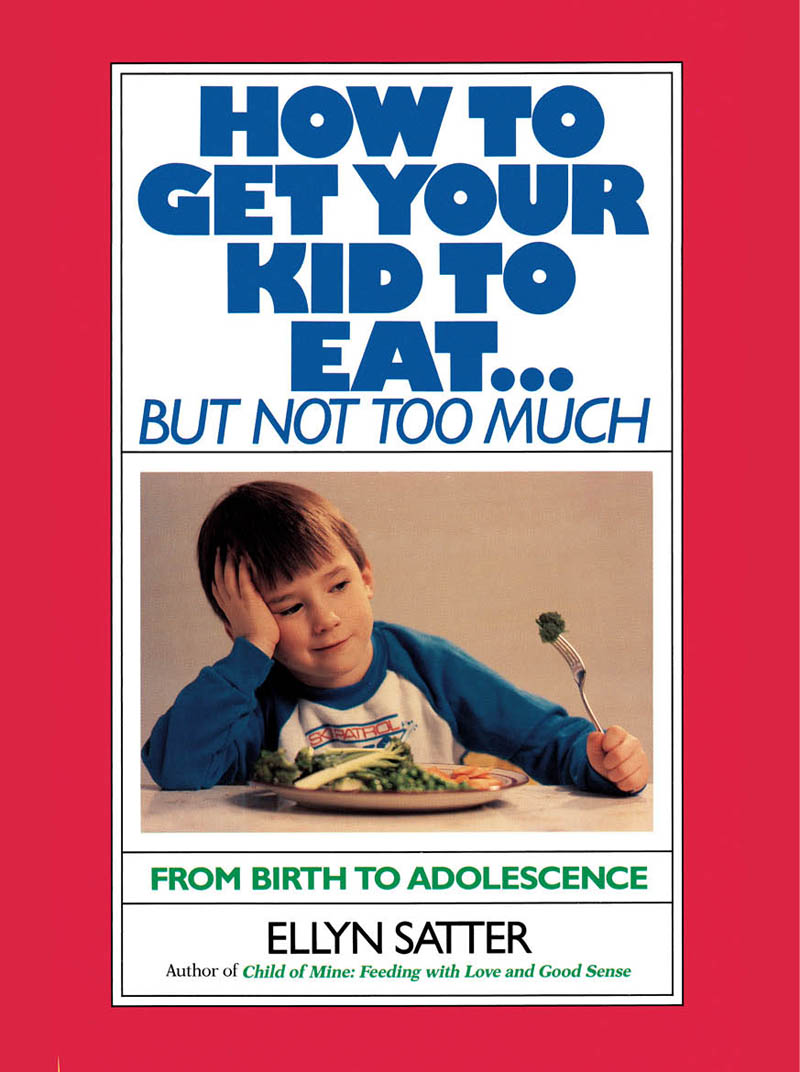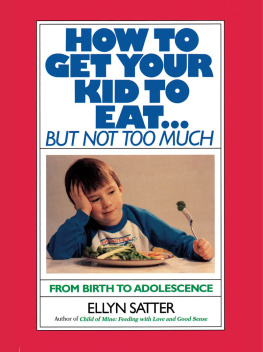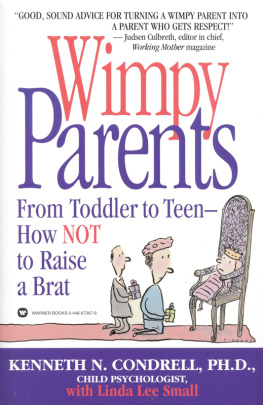
How To Get Your Kid To Eat... But Not Too Much
Ellyn Satter, RD., A.C.S.W.
Bull Publishing Company
Boulder, CO
Copyright 1987 Ellyn Satter
Bull Publishing Company
P.O. Box 1377
Boulder, CO, 80306
(800) 676-2855
www.bullpub.com
All rights reserved. No reproduction or use of the text or illustrations is allowed without the express permission of the publisher.
Printed in the U.S.
Library of Congress Cataloging-in-Publication Data
Satter, Ellyn. How to get your kid to eat
but not too much.
Bibliography: p. Includes index. 1. Children
Nutrition. 2. Child rearing. I. Title.
RJ206.S243 1987649 .387-25620
ISBN 978-1-936693-29-0
Cover Design: Robb Pawlak
Cover Illustration: Kit C. King
Interior Design: Detta Penna
Text Illustrator: Ken Miller
Chapter Opening Art: Karen Foget
Production Manager: Helen ODonnell
To Donald Williams, who knows children, and David Bull, who knows books.

This book did not come from me alone. My family, friends and colleagues gave generously of their time, expertise and encouragement, and I thank them.
For professional contributions and evaluation of the manuscript: Jack Bailey, Ph.D.; Melinda Bailey, Ph.D.; Bonnie Broderick, R.N.; Crista Dean, R.D.; Richard Guthrie, M.D.; Thomas Linscheid, Ph.D.; Deb McMillan, M.S.; Susan Nitzke, Ph.D.; Karen Ostrov, Ph.D.; Gail Price, Ph.D.; Deborah Roussos, M.S., R.D.; Erica Serlin, Ph.D.; Leona Shapiro, Ph.D.; Tom Tatum, M.A., CCC-SP; and Donald Williams, M.S.S.W., A.C.S.W.
For expert and resilient collaboration in putting together our mutual endeavor: Pat Anderson, David Bull, and Helen ODonnell.
For love, encouragement, tolerance, distraction, humor, family maintenance and even word processing: Larry Satter, Kjerstin Satter, Lucas Satter, and Curtis Satter.
For her exquisite drawings: Karen Foget.
Table of Contents
BASIC PRINCIPLES OF FEEDING
1.All About Eating
What Its Like for the Child
Why This Book?
A New Look at Feeding
Problems with Feeding
Summary of the Book
2.Quit When the Job Is Done
The Division of Responsibility in Feeding
How It Applies
How It Helps
Limiting Your Efforts
Dividing Responsibility as Children Grow Up
3.Pressure Doesnt Work
Almost Everybody Forces
Forcing Can Take Many Forms
Pressure Can Be Forcing Food In
Pressure Can Be Withholding Food
Pressure Can Be on Food Acceptance
Children Vary in Their Eating
Forcing Can Make a Child Grow Poorly
Children Can Call Out Forcing
Even Subtle Forcing Backfires
Parents Must Understand Why They Force
4.How Much Should Your Child Eat?
You Cant Predict
Children Vary Day-to-Day
Children Vary Child-to-Child
Controlling Amounts Doesnt Work
Growth Is Determined Mostly by Genes
Helping Your Child Like His Body
Understanding Kids Growth
Surprises in Growth
Girls and Dieting
5.What Is Normal Eating?
Definition for Adults
Variations in Normal
Temperament
Hunger
Love of Eating
Food Preferences
Tempo
Capability
Difficulty Learning to Eat
Miscellaneous Glitches
6.Nutritional Tactics for Preventing Food Fights
Choose Age-appropriate Food
Have Regular Meals and Snacks
Take Snacks Seriously
Making Eating Worthwhile
Make Some Modifications
On the Matter of Vegetables
About Milk
Considering Meat
On Breads and Cereals
Margin of Error
The Dietary Guidelines
The Problems of Excess
Set Reasonable Goals
FEEDING AS YOUR CHILD GROWS
7.The Newborn
Feeding the Newborn
Learning How Babies Talk
A Spitting-up Problem
Observe Feeding Interactions
Feeding Small Babies
Observing Your Baby
What About Spoiling?
Feeding and Growth
Obesity
Poor Growth
8.The Older Baby
The Six- to Twelve-Month-Old
Parenting
The Mechanics of Feeding
Starting Solids
Table Food
Feeding Going Well
Feeding Going Poorly
The Consequences of Poor Feeding
The Rewards of Good Feeding
9.Is Your Toddler Jerking You Around at the Table?
Understanding the Toddler
Parenting the Toddler
Going Along, Helping
Setting Limits
Hanging in There
Choose Your Battles
Have Regular Meals and Snacks
Make Mealtime Pleasant
Hang Loose About Food Acceptance
Dont Short-Order Cook
Be Realistic About Amounts
Get There First
Keep Her Comfortable
Know Your Audience
Know Your Nutrition
Dont Be Too Free with Juice and Milk
Dont Make Dessert a Reward
Help Your Child Be Successful with Eating
Keep Her Safe
Obesity
Ignore Miscellaneous Kinky Behavior
10.The Popular Preschooler
Understanding The Preschooler
Childishness
Purposefulness
Parenting the Preschooler
Supporting Your Childs Initiative
Parenting with Food
Have Structured Meals and Snacks
Avoid Pressure on Food Acceptance
Mealtime Behavior
Make Maturity Demands
Trust Their Desire to Grow
Teach Your Child How to Behave
Avoid Forcing
Obesity
Television
11.The Industrious Schoolager
Understanding the School-Age Child
Early School-Age
Late School-Age
Parenting the School-Age Child
Setting Limits
Tasks, Teaching, and Encouragement
Praise and Recognition
Working Things Out with Other People
Meals
Idiosyncracies
Managing Hunger
Mealtime Pleasantries
Single Parenting
Snacks
Experimenting with Eating
Fluctuations in Appetite
Finickiness
Interceding for Your Child
School Lunch
Dont Be Too Protective
Dieting
Let Her Take the Lead
12.The Individualistic Teenager
Understanding the Adolescent
Physical Changes
Patterns of Thinking
Sexual Maturation
Why Parents Dont Like the Teen Years
Teaching Responsibility
Emotional Maturation
Problems
Authoritative Parenting
Letting Go
Parenting with Food
Extremes in Eating
Nutritional Risks and Safety Margins
The Parents Role
Advice and Encouragement
Avoid Criticism
Eating For Sports
Weight Reduction Dieting
Eating Disorders
SPECIAL FEEDING PROBLEMS
13.The Child Who Grows Poorly
Feeding Problems Should Be Suspected
Distinguishing Poor Growth from Slow-But-Normal Growth
Naturally Slow Growth
The Sick Child
Problems with Breast-Feeding
The Child Who Is Defiant About Eating
The Child Who Wont Progress
Failure to Thrive
Failure to Engage the Child
The Case of the Pursuing Parent
Establishing Normal Feeding
14.Helping All You Can to Keep Your Child from Being Fat
Maintain a Healthy Feeding Relationship
Using Indirect Methods
Maintain the Structure of Meals and Snacks
Teach Orderly and Positive Eating
Cut Down on Feeding Cues
Keep the Caloric Density of Food Moderate
Dont Feed Unnecessarily
Think of Your Child as Normal When Making Feeding Decisions
Use Your Own Good Judgment When Setting Feeding Limits












